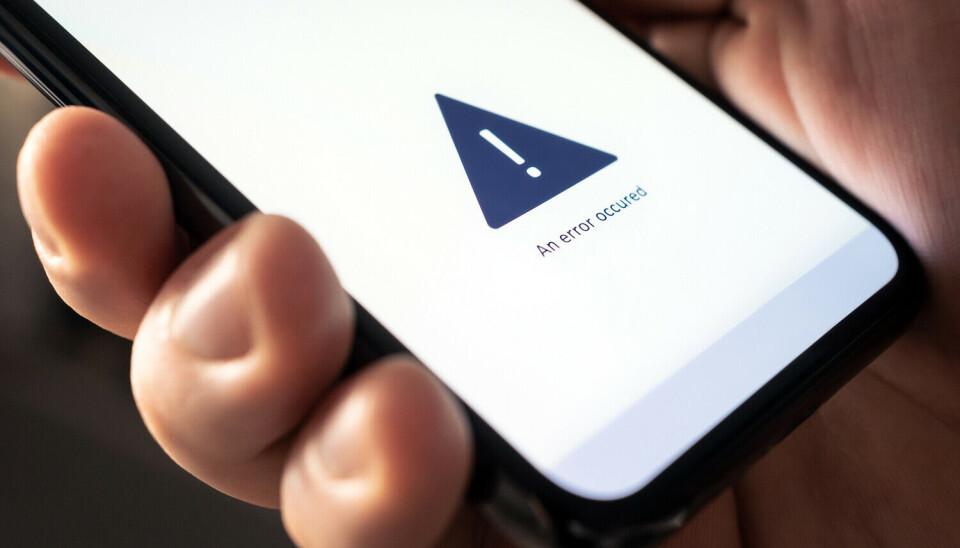
The new Russian internet: closed, censored, and “secure”
The World Wide Web is gradually disappearing in Russia — not only as an information technology, but also as a space of freedom. The Russian state today is making great efforts to build its alternative Runet — a closed and strictly controlled Russian internet. The Barents Observer has compiled an overview of what is happening in the Russian segment of the internet.
"The internet will not return until the end of the war"
Authorities in the Ulyanovsk region have announced the shutdown of mobile internet “until the end of the special military operation.” According to local media, this was stated by the regional government at a press conference. Initially, mobile connections were cut only for short periods during drone attack alerts, but in recent weeks, the internet has been disappearing around the clock across entire districts.
Oleg Yagfarov, the Minister of Digital Development of the Ulyanovsk region, said that the decision was not made at the regional level — the initiative came centrally, from the federal level. Similar measures, he added, will now be implemented in other regions where “special-purpose facilities” are located. This means that other parts of Russia may also face continuous mobile internet shutdowns.
Shutdowns across Russia
Temporary mobile internet outages first appeared in May 2025, and such incidents have continued to be recorded to this day. At first, they mainly affected border and frontline areas, but by mid-summer, disruptions were being reported across almost all regions — including Primorye, Sakhalin, Kamchatka, and the Yamalo-Nenets Autonomous Okrug. The duration of restrictions has also increased: from several hours in early May to several days, and even weeks, in some districts.
For example, in the Arkhangelsk region, over the past few weeks — starting from October 25 — the internet has been shut down more than eight times. The regional Ministry of Communications told the newspaper 29.ru that these shutdowns occur on the initiative of federal authorities. “This happens automatically during security enhancement measures,” officials said. At the moment, reports about internet outages are also coming from St. Petersburg, Sochi, and Nizhny Novgorod, according to Baza.

The project Na Svyazi (“Connected”), together with Meduza, is collecting user reports about disruptions and verifying them through technical methods. Data gathered by journalists show that shutdowns are happening not only in border regions or near military facilities, but also in areas far from combat zones. By the end of June, regular shutdowns were recorded in more than half of Russia’s regions, and in some areas, mobile internet was unavailable for 15–20 days per month. In certain regions — such as Omsk, Nizhny Novgorod, and Saratov — the restrictions have become almost permanent, and in some cities, even voice communication has begun to fail.
Is there any internet at all?
During mobile internet outages, Russians can still connect to Wi-Fi — if they have access to it. But for those who rely solely on mobile connections, access remains limited to a small number of resources included in so-called “whitelists.” The composition of these lists varies by region but typically includes Gosuslugi (the state services portal), the national messenger Max, Yandex services, the social networks VKontakte and Odnoklassniki, the marketplaces Ozon and Wildberries, banking websites, and several pro-government media outlets.
However, users often complain about the poor performance of the “approved” websites. For example, in the Komi Republic, during another shutdown in September of this year, some sites from the “whitelist” were inaccessible.
Authorities usually justify the shutdowns by citing the need to counter drones operated via mobile networks. However, accompanying government measures — discussed below — indicate that these actions go far beyond temporary “security-related” restrictions.
A separate internet
The foundation for the current changes is the “sovereign internet” law adopted in 2019. Its declared goal was to create the technical means for the autonomous operation of the Russian segment of the internet in the event of “external threats.” In practice, the law provides for the creation of infrastructure that enables the state to centrally manage internet traffic within the country. To achieve this, telecom operators are required to install Deep Packet Inspection (DPI) equipment, and a national domain name system (DNS) is being built to function independently from international servers.
In November, the government approved new regulations for managing the Russian segment of the internet, which will come into effect in March 2026. Under these rules, Roskomnadzor — the federal communications regulator — gains the authority to disconnect the Russian segment of the internet (Runet) from external resources and to completely block access to individual websites or services.
Thanks to the new regulations, Roskomnadzor will be able to centrally control network traffic: in the event of “threats to stability or security,” it will have the power to issue mandatory commands to telecom operators, reroute data transmission, activate traffic filtering, and, if necessary, isolate the Russian internet segment from the global network.
According to the published document, a “threat to network security” includes the dissemination of information online that is restricted under Russian law, as well as situations where existing methods fail to effectively block such content. In other words, if banned materials continue to circulate or circumvention tools render blocking ineffective, this is officially treated as grounds for Roskomnadzor to intervene in the internet.
As of today, nearly one million websites in Russia have been subjected to pretrial blocking at the request of Roskomnadzor, the Prosecutor General’s Office, and other censorship bodies. In addition to online casinos, drug-selling platforms, and illegal child-related content, authorities also block access to independent news outlets. Currently, more than 150 media organizations are on the list of banned outlets in Russia. For instance, the Barents Observer website was blocked in Russia back in 2019.

And now — their own messengers
After the start of the full-scale invasion of Ukraine, Russia first blocked Instagram and Facebook, as well as all other services owned by Meta — which the Tverskoy District Court of Moscow designated as an “extremist organization.” In October 2025, Roskomnadzor “partially restricted” WhatsApp and Telegram. From that moment on, Russians could no longer call each other using the country’s most popular messaging apps.
Soon after, users began reporting failures in FaceTime and Google Meet. Officially, Roskomnadzor denied blocking these services — but in practice, they became inaccessible without a VPN.
The regulator justified the blocking of WhatsApp and Telegram as part of a “fight against online fraud.” In reality, however, authorities took this step to promote their new “national” application — Max.
On June 24, Vladimir Putin signed a law establishing a national messenger. The service must be registered in Russia and have at least 500,000 daily active users. The foundation of this “state messenger” is the app Max — developed by VK and launched in beta form in March of this year.
“The emergence of a national messenger is a response to the challenges of our time. Strengthening digital sovereignty and leadership is a necessity. But these processes are not new for Russia — our country has long been a leader in digitalization… The app is meant to competitively replace unsafe foreign messengers with a more modern, functional, domestic alternative,” — said State Duma deputy Sergei Boyarsky.
The messenger Max has become a symbol of Russia’s new digital era — an era of total control disguised as “import substitution.” The state promotes it as a safe, domestic alternative to foreign services, but in reality, it turns private communication into a monitored channel. Max demands full access to the user’s device, collects telemetry and metadata, and its infrastructure is integrated with government-controlled systems.
After its launch and aggressive promotion, the app began to be implemented by force. Teachers and civil servants receive top-down orders to create work chats in Max and report their installation. In schools, class teachers check the phones of students and parents. In workplaces — especially in the public sector — installing the app has become a condition for keeping one’s job.
So what’s not allowed online anymore?
Quite a lot.
Even before 2022, Russian authorities were actively investing in surveillance systems — for example, the SORM complex, which allows the FSB to access phone conversations and internet traffic. But with the start of the full-scale war in Ukraine, control over the digital space has increased many times over.

Since early 2022, thousands of Russians have faced criminal prosecution under so-called “anti-war articles,” including “discrediting the army” and “spreading fakes” about the actions of the Russian military. In most cases, such charges are directly linked to online activity.
For instance, in January 2025, a Moscow court sentenced 64-year-old pensioner Konstantin Seleznev to eight years in prison. In a post on the social network VKontakte, he appealed to Russia’s Prosecutor General, demanding accountability for those responsible for mass killings in the Ukrainian town of Bucha. In another post, he called Vladimir Putin “the leader of a terrorist state,” according to Sever.Realii.
In June of this year, a military tribunal found an 18-year-old woman from Arkhangelsk guilty under three articles of the Criminal Code: “justification of terrorism,” “public calls to engage in activities directed against state security,” and “public calls for extremist activity.” The court sentenced her to five years in prison. The young woman was prosecuted for expressing her opinion about the war in Ukraine on social media.
Overall, according to the human rights project OVD-Info, since 2022 there have been 1,181 criminal cases opened in Russia for anti-war activities. In addition, tens of thousands of administrative cases have been launched.
But things are only getting worse. Russian authorities have begun punishing people not only for expressing opinions or sharing information — but even for searching for information online. The new legislative amendments came into force on September 1.

The first case under Article 13.53 of the Code of Administrative Offenses has already been initiated in the Sverdlovsk region. According to the outlet It’s My City, a young man accidentally opened materials related to the Ukrainian organizations Azov and RDK in his browser while using mobile internet on public transport. He did not share or repost these materials, but his internet provider recorded the access and passed the data to the FSB.
With each passing month, the list of online prohibitions in Russia grows longer. The state is tightening control on two fronts at once — over what people say and over what they read. Censorship and surveillance are expanding simultaneously: every search query, every connection, every post is logged.
VPNs remain the only way to bypass restrictions, but not everyone can use them — some fear fines, others simply lack the technical means. And for those who continue to speak publicly, new regulations have been introduced: Telegram channel owners and bloggers with more than 10,000 subscribers are now required to register with Roskomnadzor.
All of this is making the Russian internet increasingly closed and tightly controlled — a space where freedom of speech now literally comes at a high price.
















